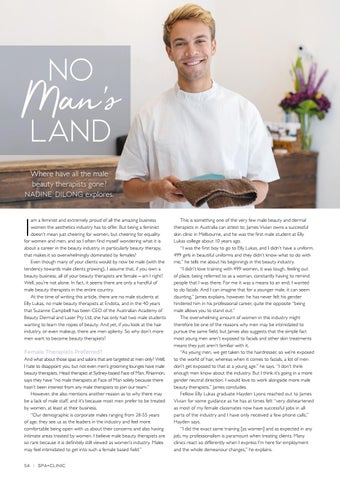Aesthetics
No Man 's Land Where have all the male beauty therapists gone? Nadine Dilong explores.
I
am a feminist and extremely proud of all the amazing business women the aesthetics industry has to offer. But being a feminist doesn’t mean just cheering for women, but cheering for equality for women and men, and so I often find myself wondering what it is about a career in the beauty industry, in particularly beauty therapy, that makes it so overwhelmingly dominated by females? Even though many of your clients would by now be male (with the tendency towards male clients growing), I assume that, if you own a beauty business, all of your beauty therapists are female – am I right? Well, you’re not alone. In fact, it seems there are only a handful of male beauty therapists in the entire country. At the time of writing this article, there are no male students at Elly Lukas, no male beauty therapists at Endota, and in the 40 years that Suzanne Campbell has been CEO of the Australian Academy of Beauty Dermal and Laser Pty Ltd, she has only had two male students wanting to learn the ropes of beauty. And yet, if you look at the hair industry, or even makeup, there are men aplenty. So why don’t more men want to become beauty therapists?
Female Therapists Preferred? And what about those spas and salons that are targeted at men only? Well, I hate to disappoint you, but not even men’s grooming lounges have male beauty therapists. Head therapist at Sydney-based Face of Man, Rhiannon, says they have “no male therapists at Face of Man solely because there hasn’t been interest from any male therapists to join our team.” However, she also mentions another reason as to why there may be a lack of male staff, and it’s because most men prefer to be treated by women, at least at their business. “Our demographic is corporate males ranging from 28-55 years of age; they see us as the leaders in the industry and feel more comfortable being open with us about their concerns and also having intimate areas treated by women. I believe male beauty therapists are so rare because it is definitely still viewed as women’s industry. Males may feel intimidated to get into such a female based field.” 54 | SPA+CLINIC
This is something one of the very few male beauty and dermal therapists in Australia can attest to; James Vivian owns a successful skin clinic in Melbourne, and he was the first male student at Elly Lukas college about 10 years ago. “I was the first boy to go to Elly Lukas, and I didn’t have a uniform. 499 girls in beautiful uniforms and they didn’t know what to do with me,” he tells me about his beginnings in the beauty industry. “I didn’t love training with 499 women, it was tough, feeling out of place, being referred to as a woman, constantly having to remind people that I was there. For me it was a means to an end; I wanted to do facials. And I can imagine that for a younger male, it can seem daunting,” James explains, however, he has never felt his gender hindered him in his professional career, quite the opposite “being male allows you to stand out.” The overwhelming amount of women in this industry might therefore be one of the reasons why men may be intimidated to pursue the same field, but James also suggests that the simple fact most young men aren’t exposed to facials and other skin treatments means they just aren’t familiar with it. “As young men, we get taken to the hairdresser, so we’re exposed to the world of hair, whereas when it comes to facials, a lot of men don’t get exposed to that at a young age.” he says. “I don’t think enough men know about the industry. But I think it’s going in a more gender neutral direction. I would love to work alongside more male beauty therapists,” James concludes. Fellow Elly Lukas graduate Hayden Lyons reached out to James Vivian for some guidance as he has at times felt “very disheartened as most of my female classmates now have successful jobs in all parts of the industry and I have only received a few phone calls,” Hayden says. “I did the exact same training [as women] and as expected in any job, my professionalism is paramount when treating clients. Many clinics react so differently when I express I’m here for employment and the whole demeanour changes,” he explains.
